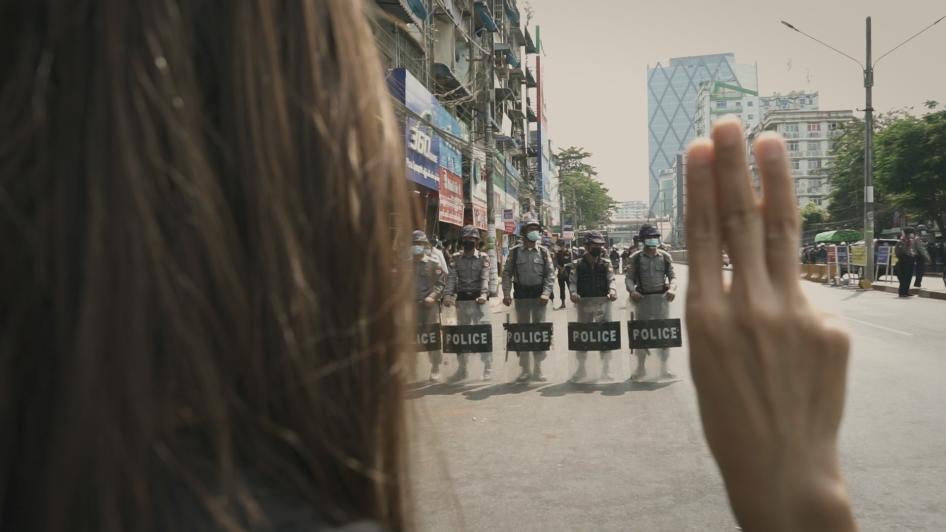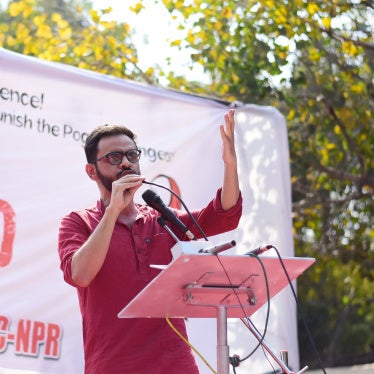(Sydney) – Myanmar’s new political parties law will prevent key members of the political opposition from running in upcoming elections, Human Rights Watch said today. The law, announced on January 26, 2023, adds to concerns that the vote now slated for August will lack all credibility and be used merely to try to legitimize further military control.
The Political Party Registration Law, which repeals 2010 legislation, prohibits anyone previously convicted of a crime or serving a prison term from joining a political party. This disqualifies many senior members of the National League for Democracy (NLD), including the party leader, Aung San Suu Kyi and President Win Myint, both serving lengthy sentences on fabricated charges. The military overthrew the newly elected NLD-led government on February 1, 2021.
“Myanmar’s junta adopted the Political Party Registration Law not only to rig the planned elections but to try to obtain legitimacy for a military-controlled state,” said Manny Maung, Myanmar researcher at Human Rights Watch. “The junta is creating a system to crush all political opposition and derail any possible return to democratic civilian rule.”
The new law states that existing political parties must reregister within 60 days of the law’s enactment or risk being dissolved, and disqualifies any political group declared as an “unlawful association or terrorist organization under any existing law.” The junta has already declared the opposition National Unity Government (NUG) and its parliamentary body, the Committee Representing the Pyidaungsu Hluttaw (the Union Parliament) as “terrorist organizations” for alleged attacks against the military since the coup.
The law requires political groups seeking to put forward electoral candidates to have at least 100,000 members within three months of registering, a huge increase from 1,000 in the previous law, and a prohibitive bar for most parties. It also requires national political parties to have funds of at least 100 million kyat (US$47,000) to qualify for registration, far more than most smaller parties can afford. For regional or state parties, the minimum amount required in the party coffers is 10 million kyat ($4,700). These requirements will make it nearly impossible for smaller ethnic and minority parties to take part in elections, Human Rights Watch said.
The NLD responded that it “steadfastly” objected to any election under the military junta, and that it refused to register. Other smaller parties, such as the Kayah State Democracy and the Kayan National Party, also said they will not register and therefore face dissolution. Some ethnic minority parties such as the Shan Nationalities Democratic Party and the United Democracy Party have indicated they plan to register.
The People’s Defense Forces, which are anti-junta militias, have indicated that they aim to disrupt preparations for the elections and have attacked some junta personnel conducting a population survey that could be used to assemble voter rolls. This raises concerns that members of political parties that register under the new law could also be targeted.
On February 1, 2023, the junta extended the state of emergency in the country for six months. On February 2, the junta imposed new martial law orders in 37 additional townships in Chin, Karen, Karenni, Magway and Mon States, and Bago, Sagaing, and Tanintharyi Regions. The orders impose curfews and curb freedom of association and movement, restricting political parties from organizing.
The military-drafted 2008 Constitution, although designed to perpetuate military control, requires the state to enact laws to allow political parties to organize for the “flourishing of a genuine, disciplined multi-party democratic system.” Under the new law and additional martial law orders, any election would be dominated by junta-backed political parties and the military itself, which already holds 25 percent of seats in the national and local legislatures under the 2008 Constitution.
The Political Parties Registration Law fails to meet international standards in respecting the rights of political parties to organize and stand for election. Under international law, voters should have the right to freely choose their candidates, and any conditions placed on political party and candidate registration should be reasonable and non-discriminatory.
Establishing a credible, pluralistic, and rights respecting electoral system is essential to holding genuine democratic elections in which voters freely choose their representatives. Despite the limitations imposed by the 2008 Constitution, in November 2020, voters exercised their right to choose their government, a right that the military denied by staging a coup.
Concerned governments, including regional partners such as member states of the Association of Southeast Asian Nations (ASEAN), Japan, and India, should condemn the political parties law and ensure that they do not lend credibility to the junta’s attempt to legitimize military control through sham elections.
The United Kingdom, the United States, and European Union member states should coordinate with other like-minded governments to strengthen and enforce targeted sanctions against senior junta officials and military entities in Myanmar.
“The 2021 military coup strangled the hopes of the Myanmar people who had voted in credible elections in 2020,” Maung said. “Concerned governments need to put concerted pressure on the junta to return to a democratically elected civilian government.”









